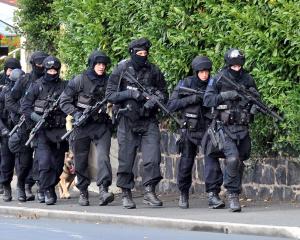This is a story about the price of milk.
And Paul Renouf has had a gutsful.
Not of milk you understand, but of the lactose-loving thief who swipes the milk the amiable vendor delivers each morning while most law-abiding citizens lie tucked up in bed.
''I was just getting sick of it, I was losing customers and it was happening every week.''
As a last resort - and not expecting much - he went to police to report the case of the missing milk. And the result?Well; prepare to raise a glass of milk.
''It was incredible what they did ... for a guy who stole some milk,'' the owner/operator of Dunedin City Milk said.
Hundreds of dollars worth of milk had been stolen in the four and a-half years he had run the business; but it was a spate of thefts over a six-week period that left him fuming and out of pocket.
Even his trick of putting the blue top behind the green top (turns out ''people are less likely to take the green'') failed to deter the thief.
''I have to wear this ... it is my milk.''
And those thefts not only left him out of pocket but also caused a couple of clients to cancel their orders due to the thefts.
''I went to police to see what they would say, and they were dead serious: ''We will do what we can''.''
Enter Senior Constable Ruth Parsons.
The community constable, who has been based in South Dunedin for 13 years, interviewed Mr Renouf about the thefts and provided updates on the case and advice on when to drop off milk.
''I thought they would take a note of it and that would be the last thing I would hear ... I didn't expect them to go out and hide in buildings and wait for this guy,'' he said.
Hide? That's right - a stakeout of the milk hot spots begins.
First up, officers monitor the rear of a bank in Rankeilor St, ''trying to work out where the hell the person was coming from'', Snr Const Parsons said.
''Nothing happened.''
So Snr Const Parsons and her sergeant choose another night, lying in wait near the rear of a bank in Rankeilor St from 4am.
''Nothing happened.''
Cold but undeterred, the pair head back to the station only to be told by Mr Parsons milk had been stolen from another location nearby.
But early one cold Dunedin morning, a determined Snr Const Parsons and five other plainclothes officers wait in several positions for the culprit.
They wait ...and they wait.
''It was very light by 6am and we were going to pull the pin because we thought no-one in their right mind will nick it now because there are quite a few people around at that time.''
But as fate would have it, a middle-aged man walks up and swipes a one litre bottle of milk. Instead of enjoying some free milk with his porridge, he is promptly arrested by Sergeant Matt Scoles.
''We caught him with blue top.''
The 45-year-old unemployed man appeared in the Dunedin District Court last month, charged with theft.
''It felt good to catch him, because everyone was getting a wee bit frustrated ... and tired when the alarm goes off so early.''
Snr Const Parsons said the stakeouts were her first as a police officer, and she would do it again.
As she would investigate a crime as small as a bottle of milk going missing.
''It is about doing what is right.''
And from Mr Renouf - ''I just hope this puts people off''.
So how petty is petty crime? Southern district commander Superintendent Bob Burns said petty crime mattered to police and ''the tolerance level of crime is a lot lower in this neck of the woods than other parts of the country''.
He cited the ''broken windows theory'' which suggests keeping a well maintained urban environment will lead to fewer serious crimes.
''Most of our offenders don't start by being the most serious burglars or assault artists in the world - they start with apprentice crimes, like theft ex cars. [If] they get comfortable in that crime type, they will move on to another crime type.''
He said the message to his officer was small crime was an important focus as it not only prevented serious crime, it mattered to the community.
''Losing a garden gnome from an elderly person's front yard is just as much an invasion of privacy and that person's rights as someone going into the house.''
Police statistics for 2011-12 show crime in the Southern District dropped by 11.2%, and ''this is from focusing on the smaller stuff''.
Supt Burns said petty crime was not a category itself, but lower level crime such as dishonesty made up around 40% of all reported crime.
For non-serious offences, Southern District officers prioritised cases on ''solvability'' but would investigate anything that was reported, he said.
Supt Burns recalled a time in Nelson when a number of Auckland staff were down for a tangi.
''They were having a cup of tea and suddenly they hear all these feet rushing down the stairs, going into the cars, and sirens going rushing out of the station''.
''They looked around thinking something major had happened.''
Turns out the crime on the mean streets of Nelson was a tagger being caught in the act.
''That is the difference in the South Island. We respond to the little stuff ... to the astonishment of some of our northern brothers.''
In another case of petty crime, police in Invercargill last month borrowed a crime-solving technique from the Tom Cruise film, Minority Report, solving a crime before it even happened.
Police mentioned in their morning meeting about a sign spotted outside a home saying ''please return my minibike'' posted by Luke, aged 7.
That same day, a local youth offender told his youth mentor a couple of people brought a bike matching the description to his house, Invercargill Youth Aid section Senior Constable Andy Fraser said.
Police recover the tiny bike even before an official complaint had been made on behalf of the victim.
And the result?
A sign appeared outside young Luke's home saying ''Thanks Police for finding my minibike!''
From the heartwarming to the plain ridiculous.
Senior Constable Robert Wallace, of Lawrence, recalled ''some years ago'' officers in an unnamed town where he used to work were trying to solve a spate of recent burglaries.
Spotting a well-known criminal walking down the street, he approached him for a word.
''I told him it would be in his best interests to admit to [the burglaries] because we had fingerprints, and if he goes to court he probably wouldn't get much of a sentence''.
The criminal did not admit he had anything to do with the burglaries, which had police stumped.
''But sure enough the next day he went into this police station, admitted to the burglaries and went to court.''
Snr Const Wallace said ''sometime later'' he bumped into the man after he was released from prison, and told him admitting to the burglaries was the right thing to do.
''He said: `Yes, but how did you get my fingerprints? ... I wore gloves'.''
But police work is not all about solving crime.
Senior Sergeant Brian Benn, of Dunedin, said police enjoyed one-to-one contact with the public, and ''you always get an immense amount of satisfaction helping someone that has a problem, no matter how small''.
One of his favourite memories occurred in his capacity as a search and rescue co-ordinator.
Several years ago, he was called out on Easter to the Taieri River area to look for a missing man and some children.
When he found the cold and wet group, he offered them some of his family's Easter eggs, which he had grabbed on his way out the door.
''Those eggs were really appreciated, I can tell you.''








